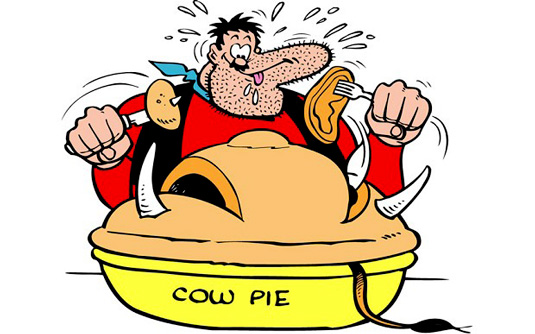Morning run on empty stomach?

lilstry
Posts: 120 Member
In the past I heard that doing cardio burns fat when your body is in a fasted state. I wake up every morning at 5:30. Should I eat something light, wait 30 min, and then run? any other suggestions?
0
Replies
-
As long as your daily calories remain constant, fasted cardio will be no different than fed cardio1
-
Cardio burns calories not fat.
It makes zero difference as long as you are eating in a deficit on average.
Eat or don't eat whatever makes you more comfortable with the energy you need.1 -
I prefer to run on empty in the morning. For me it's a time preservation issue. I'd rather do the run and then eat.4
-
I prefer to run empty (early morning run), my stomach gets upset fairly easily so I wait until evening to eat.0
-
mean_jeannie wrote: »I prefer to run on empty in the morning. For me it's a time preservation issue. I'd rather do the run and then eat.AlphaHowls wrote: »I prefer to run empty (early morning run), my stomach gets upset fairly easily so I wait until evening to eat.
Don't you ever feel dizzy when doing a fasted run?
2 -
Personally, the difference between having a light meal (for me that's usually a protein bar and a cheese stick) 20 minutes before running and eating nothing is huge. If I eat nothing, I burn out fast and feel awful. I don't even think I can get a mile in before I'm crashing and feeling ill. I can't eat a large meal either. That just makes me sluggish. But if I eat something light I'm good to go and can run forever. It's going to be different for everyone. Just do what works best for you!
 1
1 -
There was a ton of bro-science about this for years, but nothing has been validated.pinggolfer96 wrote: »As long as your daily calories remain constant, fasted cardio will be no different than fed cardio
Personal experience is not science, but here goes.
This seemed to work for me, but my results could be coming from other factors, so I can't really say for sure. I do it as part of Intermittent Fasting.
Sometimes I just need to try things for myself.
My suggestion to the OP is try it out yourself for 6 weeks, and just see what happens. Post your results one way or the other.
1 -
I exercise/run in the early morning. I haven't eaten anything since dinner the evening before and don't eat until lunch. I find this helps me maintain my calorie deficit and I'm losing weight (Intermittent fasting; 14 hr fasting/10 hr eating window). Like others have said here and in other threads, it doesn't matter when you eat or exercise, but if you maintain an appropriate deficit.0
-
It might depend on how far you're going to run, but it's often better to eat something before you run.
From the Australian Institute of Sport:
"Many athletes put a lot of emphasis on the pre-event meal believing it is the key element to performance. It is important to remember that food eaten throughout the training week and food and fluid consumed during the event is just as important. Consuming food and fluid before exercise should be seen as an opportunity to fine-tune carbohydrate and fluid levels and to ensure you feel comfortable and confident.
When should I eat?
Food consumed before exercise is only useful once it has been digested and absorbed. This means you need to time your food intake so that the fuel becomes available during the exercise period. The time required for digestion depends on the type and quantity of food consumed. Generally, foods higher in fat, protein and fibre tend to take longer to digest than other foods, and may increase the risk of stomach discomfort during exercise. Large quantities of foods take longer to digest than smaller quantities. Generally, food is better tolerated during lower intensity activities, or sports where the body is supported (e.g. cycling) than sports such as running where the gut is jostled about during exercise. A general guide is to have a meal about 3-4 hours before exercise or a lighter snack about 1-2 hours before exercise. You need to experiment to find the timing, amount and make up that best suits your individual needs."
http://www.ausport.gov.au/ais/nutrition/factsheets/competition_and_training/eating_before_exercise
More on what to eat at the link.4 -
How far are u going to run? I frequently do about 30 mins straight out of bed then eat/drink after. It's personal preference but just make sure you're hydrated.0
-
AlphaHowls wrote: »I prefer to run empty (early morning run), my stomach gets upset fairly easily so I wait until evening to eat.
Same with me but only for short runs. When I go out for longer runs I usually grab something small (like half a large banana with a teaspoon of peanut butter) and leave immediately.1 -
I usually run on an empty stomach in the morning (barring a coffee that is) as I'm not keen on running straight after eating and prefer to get out early. If I'm doing a longer run I will eat first though.1
-
Runners like to do easy runs fasted because being good at burning fat as fuel is useful during endurance events. But it's for training not weight loss.0
-
mean_jeannie wrote: »I prefer to run on empty in the morning. For me it's a time preservation issue. I'd rather do the run and then eat.AlphaHowls wrote: »I prefer to run empty (early morning run), my stomach gets upset fairly easily so I wait until evening to eat.
Don't you ever feel dizzy when doing a fasted run?
I know it's not aimed at me but I also work out and run in a fasted state. I don't get dizzy or feel any ill effects at all but my endurance does suffer a little. If I eat shortly before a work out a I get an upset stomach and feel queasy. My sweet spot seems to be at least 2-4 hrs after a meal.
Like most answers on here it varies. You burn calories which is energy from fat and muscle. You won't burn any more calories or anything special it's just an individual preference.1 -
How far are u going to run? I frequently do about 30 mins straight out of bed then eat/drink after. It's personal preference but just make sure you're hydrated.
Lol I'm a noob at running so I do about 30 minutes alternating to walking. My main goal is to do 30 minutes without stopping to walk.
Overall I tried in a fasted state and my endurance isn't the same, just like alluminati said. Next time I'll try eating half a banana or coffee.
0 -
Assuming you well hydrayted anyway, id do early morning 5k runs on no more than a coffee and a banana. Then take a small water bottle to run with.
Body should have enough on tap reserves to cover 30mins jogging and walking.
If your sweet starts smelling ammonia like, then you have gone through your on tap reserves, then maybe consider a carb based snack before. But shouldnt be needed for 30mins running.
0 -
I do a 30-40 minute elliptical workout in the morning. If I do it on an empty stomach , I would probably faint !0
-
I almost always run on empty. Though doing 14 miles yesterday on not much more than a bowl of cereal 6 hours previously became challenging on the legs. Managed it, and then ate the quantity of food you usually only see in cartoons...
 3
3 -
Question:Cardio burns calories not fat.
It makes zero difference as long as you are eating in a deficit on average.
Eat or don't eat whatever makes you more comfortable with the energy you need.
What about the fuel for the energy represented by the calorie burn?
How does one shift the odds of that being derived from stored fat as opposed to sugar?
I am studying info that is scientifically inconclusive and contradictory. Just wondering your take on it given your obvious knowledge.
0 -
I run ever morning fasted at 5:30 a.m. I make sure the nutrition I ate the day before is adequate enough and I am hydrated. I personally do not beleive in the running fasted burns more fat or fat faster running fasted than if one were to eat 1-2 hours before). I also could not eat 30 minutes before a run, this may cause me a lot burping in the run.1
-
No you don't need to. Personally I train fasted. Weights & cardio. No loss of strength whatsoever. If anything I'm stronger.0
-
I run fasted, for anything under about 10 miles. Mostly because I don't want to get up any earlier than I already am.
0 -
In the past I heard that doing cardio burns fat when your body is in a fasted state. I wake up every morning at 5:30. Should I eat something light, wait 30 min, and then run? any other suggestions?
Your body uses a combination of stored glycogen and fat when exercising. The lower the intensity the higher the proportion of fat (you actually burn the most fat while sleeping....), don't fixate on fat burning concentrate more on total calorie burn.
If you find yourself lacking energy before working out you may want to have something light with simple carbs, personally I prefer to run fasted for runs under 90 minutes (pure personal preference, I hate feeling full when I'm running). It's a little trial and error, do what works for you.1 -
I run fasted, and without drinking anything until I get home, because I go out early in the morning, roll out of bed, pee and put on clothes and go.
Can do up to 1 hour run with no food no water, and while there is zero chance that I will want to wake up at 2am just to eat so that it can digest before I run, a good supper the night before makes a big difference. When I skip supper my run will suck.
There is some evidence that fasted morning cardio helps bodies to handle carbohydrates better, and if you have not enough glucose in your blood your body uses fat, but that doesn't have anything to do with losing bodyfat overall. Weight loss or gain is more like a settling of accounts while you sleep - you have either a net gain or loss over the day and it's added or subtracted overnight.2 -
Return2Fit wrote: »
Question:Cardio burns calories not fat.
It makes zero difference as long as you are eating in a deficit on average.
Eat or don't eat whatever makes you more comfortable with the energy you need.
What about the fuel for the energy represented by the calorie burn?
How does one shift the odds of that being derived from stored fat as opposed to sugar?
I am studying info that is scientifically inconclusive and contradictory. Just wondering your take on it given your obvious knowledge.
Although not directed at me, your body burns fuel on a continuum. There's no switch that flips that goes from glycogen to fat. However, the more you are exercising in the aerobic system, the more of your energy that will come from oxidizing fat. BUT, just because that is the case for that particular exercise session, doesn't mean it's the best route to go. Total calories burned trumps where they came from if your goal is weight loss.0 -
Return2Fit wrote: »
Question:Cardio burns calories not fat.
It makes zero difference as long as you are eating in a deficit on average.
Eat or don't eat whatever makes you more comfortable with the energy you need.
What about the fuel for the energy represented by the calorie burn?
How does one shift the odds of that being derived from stored fat as opposed to sugar?
I am studying info that is scientifically inconclusive and contradictory. Just wondering your take on it given your obvious knowledge.
The fuel source is pretty much meaningless in the context of weight loss, if you were an endurance athlete it's a different story. Compared to stored glycogen even the skinniest marathon runner has a a huge amount of energy available as as stored body fat and they do a lot of very low intensity running to train their bodies to burn fat.0 -
For me, I prefer to work out mostly fasted. When my belly is full I get tired easier and want to relax rather than work out. After 8 hours of sleep and no breakfast I tend to do my morning workout, then have a breakfast of complex carbs and high protein after. However, on the weekends I increase my workouts for endurance, and for those I eat the complex carbs (usually bran cereal with almond milk) before my workout otherwise I burn out faster than I'd like. I do believe it helps to burn fat, but science or not, it works for me. Honestly though if you eat right after your workout I can't really see your body burning any more fat than it would if you ate before. Just give it a try for a while and see if you like it. I do sip on an intra-workout drink though, usually BCAA's of some sort so that I'm not burning what little muscle I've managed to gain. I think the drink is a total of around 50 calories and my usual burn is somewhere in the 800-1000cal range during my workout so it really doesn't make a big difference. Even on the weekends when I eat carbs before working out that is only a couple hundred more calories and the burn is higher. For me it's helping to reduce body fat, I'm down to 12% over the summer so far from 14% in the early spring. I can't say for sure that it worked faster though because that's how I did it. Someone eating before working out might have dropped 2% just the same.. who knows.0
-
Return2Fit wrote: »
Question:Cardio burns calories not fat.
It makes zero difference as long as you are eating in a deficit on average.
Eat or don't eat whatever makes you more comfortable with the energy you need.
What about the fuel for the energy represented by the calorie burn?
How does one shift the odds of that being derived from stored fat as opposed to sugar?
I am studying info that is scientifically inconclusive and contradictory. Just wondering your take on it given your obvious knowledge.
Although not directed at me, your body burns fuel on a continuum. There's no switch that flips that goes from glycogen to fat. However, the more you are exercising in the aerobic system, the more of your energy that will come from oxidizing fat. BUT, just because that is the case for that particular exercise session, doesn't mean it's the best route to go. Total calories burned trumps where they came from if your goal is weight loss.
This.0
This discussion has been closed.
Categories
- All Categories
- 1.4M Health, Wellness and Goals
- 398.2K Introduce Yourself
- 44.7K Getting Started
- 261K Health and Weight Loss
- 176.4K Food and Nutrition
- 47.7K Recipes
- 233K Fitness and Exercise
- 462 Sleep, Mindfulness and Overall Wellness
- 6.5K Goal: Maintaining Weight
- 8.7K Goal: Gaining Weight and Body Building
- 153.5K Motivation and Support
- 8.4K Challenges
- 1.4K Debate Club
- 96.5K Chit-Chat
- 2.6K Fun and Games
- 4.8K MyFitnessPal Information
- 12 News and Announcements
- 21 MyFitnessPal Academy
- 1.6K Feature Suggestions and Ideas
- 3.2K MyFitnessPal Tech Support Questions



















